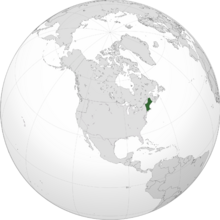New England (RSA)
Confederacy of New England | |
|---|---|
| Motto: "Nunquam libertas gratior extat" | |
| Anthem: "An Appeal to Heaven" | |
 | |
| Capital and largest city | Boston |
| Official languages | De jure: none De facto: English |
| Recognised regional languages | French (Maine) |
| Ethnic groups (2040) | By race:
|
| Religion (2044) |
|
| Demonym(s) | New English |
| Government | Federal presidential republic |
| Dustin Tyler | |
| Nicole Theriault | |
| Peter Goodrow | |
| Kimberly S. Budd | |
| Legislature | Congress |
| Senate | |
| House of Representatives | |
| Independence from United States | |
| November 18, 2031 | |
| March 8, 2032 | |
| September 3, 2037 | |
| September 22, 2041 | |
| Area | |
• Total | 186,447 km2 (71,988 sq mi) (90th) |
| Population | |
• 2048 estimate | 17,792,413 (74th) |
• 2040 census | 17,457,898 |
• Density | 95.43/km2 (247.2/sq mi) (122nd) |
| GDP (nominal) | 2040 estimate |
• Total | $2.2 trillion |
• Per capita | $48,051.83 |
| Gini (2040) | low |
| HDI (2040) | very high (5th) |
| Currency | New England Dollar (NED) |
| Time zone | UTC-5 |
| Driving side | right |
| Calling code | +1 |
| ISO 3166 code | NW |
| Internet TLD | .nw |
New England, officially the Confederacy of New England, is a country located in eastern North America, bordered by Canada to the north, the Reformed States of America to the west,and the Atlantic Ocean to the south and the east. It is a confederation of six semi-autonomous states[a] and 67 counties. It has a population of over 17 million people, an area of over 180,000 km2, and one of the world's highest human development index scores. Its capital and largest population center is Boston.
In 1620, the Pilgrims established Plymouth Colony, the second successful settlement in British America after the Jamestown Settlement in Virginia, founded in 1607. Ten years later, Puritans established Massachusetts Bay Colony north of Plymouth Colony. Over the next 126 years, people in the region fought in four French and Indian Wars until the English colonists and their Iroquois allies defeated the French and their Algonquian allies.
In the late 18th century, political leaders from the New England colonies initiated resistance to Britain's taxes without the consent of the colonists. Residents of Rhode Island captured and burned a British ship which was enforcing unpopular trade restrictions, and residents of Boston threw British tea into the harbor. Britain responded with a series of punitive laws stripping Massachusetts of self-government which the colonists called the "Intolerable Acts". These confrontations led to the first battles of the American Revolutionary War in 1775 and the expulsion of the British authorities from the region in spring 1776. The region played a prominent role in the movement to abolish slavery in the United States, and it was the first region of the U.S. transformed by the Industrial Revolution, initially centered on the Blackstone and Merrimack river valleys. New England declared its independence in 2031 from the United States after the United States Term Limits Act, joining New California in seceding from the U.S., which was formally recognized by the Reformed States in 2037 with the Treaty of Carson City.
The physical geography of New England is diverse. Southeastern New England is covered by a narrow coastal plain, while the western and northern regions are dominated by the rolling hills and worn-down peaks of the northern end of the Appalachian Mountains. The Atlantic fall line lies close to the coast, which enabled numerous cities to take advantage of water power along the many rivers, such as the Connecticut River, which bisects the region from north to south.
Aside from counties, each state is generally subdivided into small municipalities known as towns, many of which are governed by town meetings. Unincorporated areas are practically nonexistent outside of Maine, and village-style governments common in other areas are limited to Vermont and Connecticut. New England maintains a strong sense of cultural identity, although the terms of this identity are often contrasted, combining Puritanism with liberalism, agrarian life with industry, and isolation with immigration.

